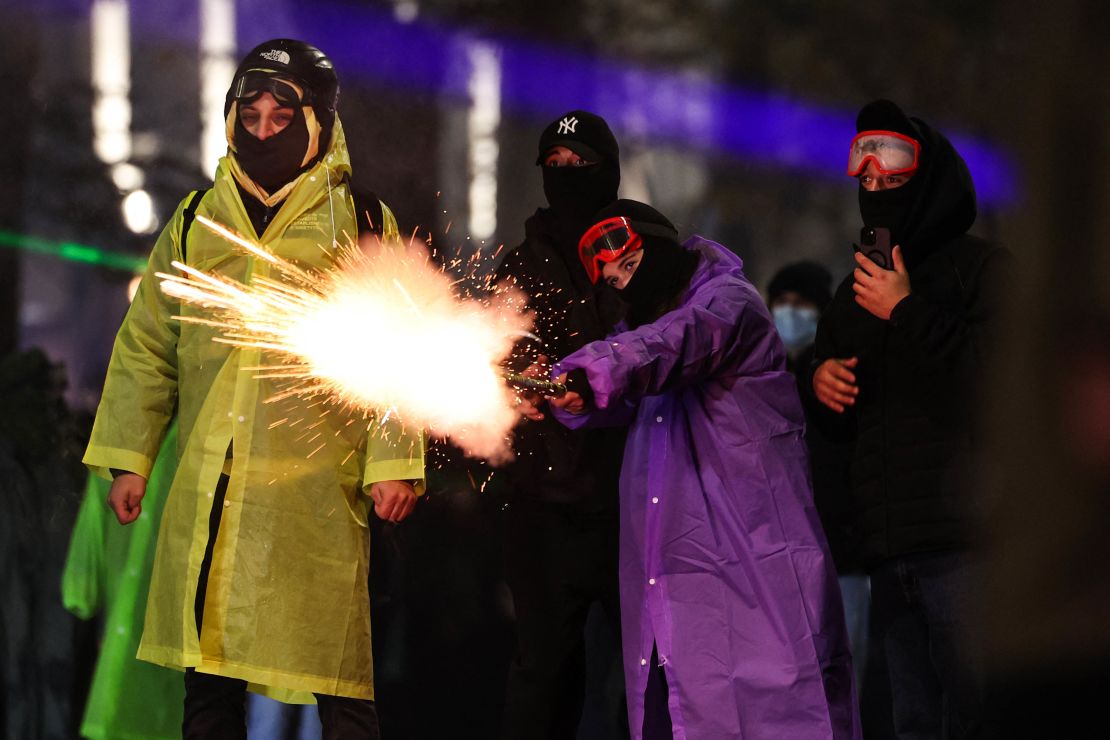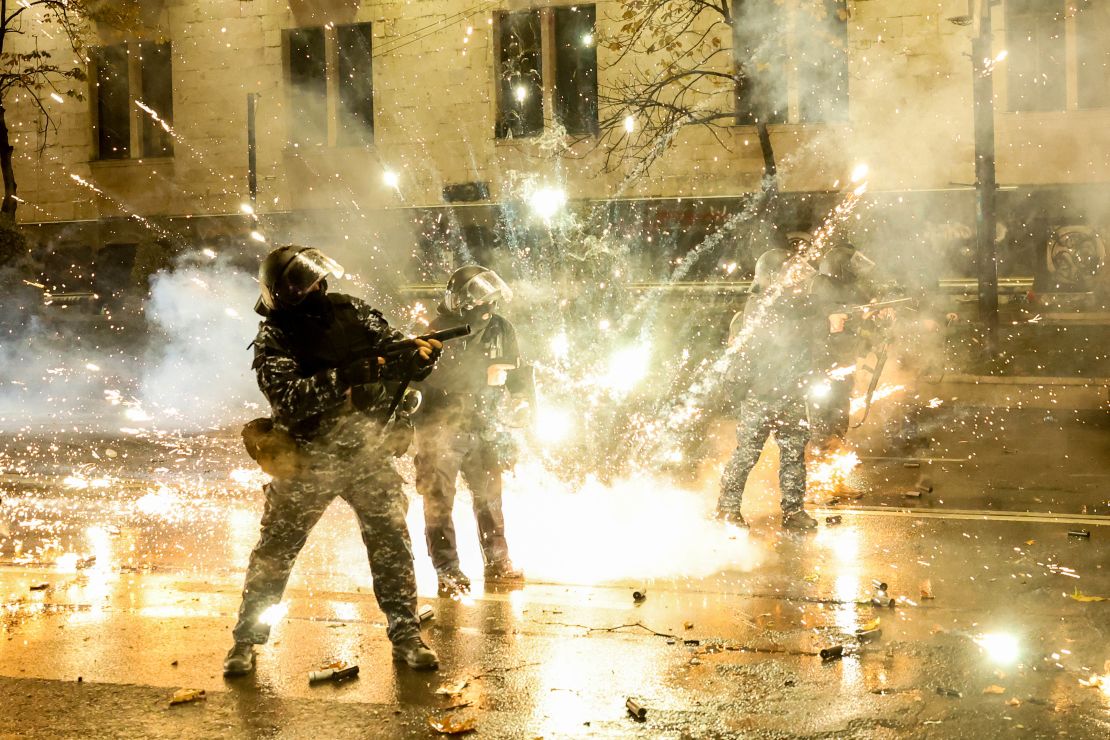CNN
—
Days of protests have rocked Georgia following the government’s controversial decision to delay the former Soviet country’s bid to join the European Union.
Tensions have been brewing for months in the South Caucasus nation of 3.7 million people, where critics accuse the ruling Georgian Dream party of following increasingly authoritarian, pro-Russia policies in a turn away from the West that has tempered hopes for Georgia’s long-promised path to EU membership.
The protests have been met with a violent police crackdown as the ruling party and thousands of protesters become locked in a deepening battle over the country’s future and whether Georgia should forge closer ties with Russia or Europe.
Here’s what you need to know.
What sparked the protests?
Tensions intensified in late October when Georgian Dream claimed victory in a contested election that was widely seen as a referendum on joining the EU.
Georgia, which gained independence from the Soviet Union in 1991, has for years pursued EU membership, with the goal of joining the bloc written into its constitution.
Most Georgians support the policy, polls consistently show, and it appeared to be on track last year when the country gained EU candidate status.
But on November 28, the government signaled a pivot away from Europe in a move which sparked widespread anger.
Prime Minister Irakli Kobakhidze said Georgia would suspend EU accession talks for four years after the European Parliament rejected the country’s election results, citing alleged irregularities.
The Georgian Dream governing bloc accused the EU of using the prospect of accession talks to “blackmail” Georgia, and to “organize a revolution in the country.”
“We have decided not to put the issue of opening negotiations with the European Union on the agenda until the end of 2028,” it said. “Also, we refuse any budgetary grant from the European Union until the end of 2028.”

What’s happening at the protests?
The government’s move brought thousands of pro-European Georgians to the streets of the capital Tbilisi, where they have rallied for consecutive nights despite a violent police backlash.
Reuters videos show protesters waving Georgian and EU flags and chanting “Russian slaves” at police officers guarding the parliament building. Police fired water cannons and tear gas at protesters, while men wearing balaclavas were seen running into the crowds and beating individuals.
The protests have spread beyond the capital, with Georgian media reporting demonstrations in at least eight cities and towns, according to Reuters.
Opposition TV channel Formula showed people in the central town of Khashuri throwing eggs at the local Georgian Dream office and tearing down the party’s flag. Demonstrators also blocked an access road to the country’s main commercial port in the Black Sea city of Poti, according to Georgian news agency Interpress.
More than 100 people have been arrested, according to Georgian officials, who claimed protesters threw stones and glass bottles at law enforcement. Dozens of people have also been hospitalized.
Residents have remarked on the forcefulness of the police response, which has been widely condemned internationally.
“I’ve seen a lot of protests in Georgia: during this government, the previous government – I also remember some from Soviet times,” Tsotne Jafaridze, a winemaker in Tbilisi, told CNN. “But such aggression – towards old people, towards the really young guys, towards the women – was unbelievable.”
Salome Zourabichvili, the country’s pro-Western president whose powers are mostly ceremonial, claimed that police “targeted journalists and political leaders.”
She lambasted what she called “brutal and disproportionate attacks on the Georgian people and media, reminiscent of Russian-style repression” at the protests.

How did Georgia get here?
Nearly 80% of Georgians support European integration, according to a poll in December last year by the US non-profit National Democratic Institute.
Many Georgians also feel a deep hostility towards Russia, which invaded Georgia in 2008 and today occupies about 20% of its internationally recognized territories.
Since Russia invaded Ukraine in February 2022, thousands of Russians – especially men of service age – have fled to Georgia to avoid conscription, tearing at the country’s social fabric as many Georgians express fears of creeping Russification.
Georgian Dream, founded by a billionaire who made his fortune in Russia, has taken a sharp authoritarian turn in recent years. Earlier this year, it pushed through a new Russian-style “foreign agent” law that allows the government to clamp down on watchdogs, alarming the EU, the US, and its political opponents within Georgia.
Experts have warned the suspension of EU talks is another sign the country is going down an undemocratic path under Georgian Dream.
“This is a red flag. It shows the government is ready to go much further with this,” Ketevan Chachava, a non-resident fellow with the Democratic Resilience Program at the Center for European Policy Analysis (CEPA) told CNN.
She said she fears Georgia is “becoming a state that is non-democratic, unfree, where liberties are not respected.”
How have the EU and US reacted?
The United States and the EU have criticized what they see as growing authoritarianism in Georgia and the aggressive response to protesters by police.
The US State Department condemned “the excessive use of force by police against Georgians” and said it was suspending the US-Georgia Strategic Partnership due to “anti-democratic actions” by the ruling party.
“We reiterate our call to the Georgian government to return to its Euro-Atlantic path, transparently investigate all parliamentary election irregularities, and repeal anti-democratic laws that limit freedoms of assembly and expression,” spokesperson Matthew Miller said in a statement.
EU foreign policy chief Kaja Kallas said the bloc stands “with the Georgian people and their choice for a European future,” in a post on social media.
“We condemn the violence against protesters & regret signals from ruling party not to pursue Georgia’s path to EU and democratic backsliding of the country,” she said. “This will have direct consequences from EU side.”
How has Georgia responded?
Prime Minister Kobakhidze dismissed the US criticism and said police had “successfully protected the state from another attempt to violate the constitutional order,” according to Reuters.
Georgian Dream has also denied it is linked to Russia.
Kobakhidze has insisted the party remains committed to Georgia’s EU bid and is only pushing back on “blackmail and manipulation” by EU politicians.
But the West has become skeptical of the party’s intentions.
So too have hundreds of Georgian diplomats and civil servants, who have signed open letters calling the delay of EU talks unlawful.
Russian President Vladimir Putin is yet to comment on the situation in Georgia.
But Dmitry Medvedev, a former Russian president prone to hyperbole who currently sits on the Security Council of Russia, described events in Georgia as an attempted revolution warning on Telegram that the country was “moving rapidly along the Ukrainian path, into the dark abyss. Usually this sort of thing ends very badly.”
CNN’s Christian Edwards and Catherine Nicholls contributed reporting.


